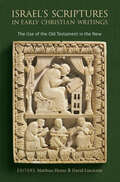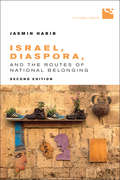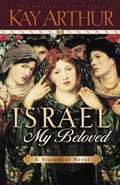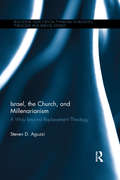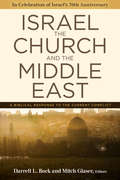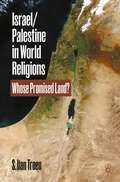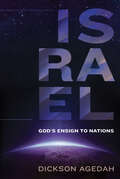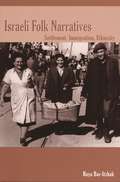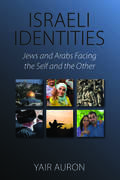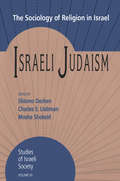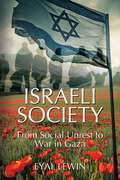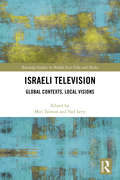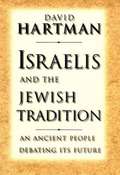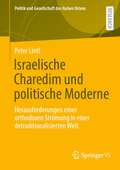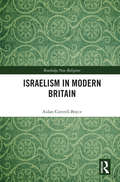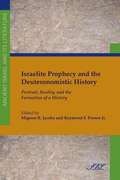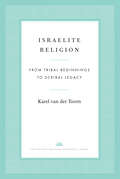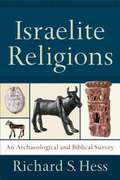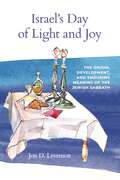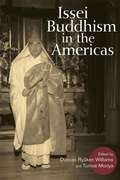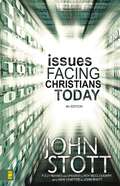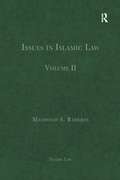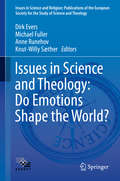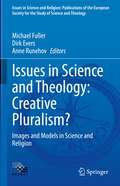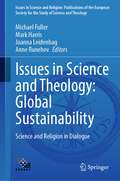- Table View
- List View
Israel's Scriptures in Early Christian Writings: The Use of the Old Testament in the New
by Matthias Henze and David Lincicum, eds.How did New Testament authors use Israel&’s Scriptures? Use, misuse, appropriation, citation, allusion, inspiration—how do we characterize the manifold images, paraphrases, and quotations of the Jewish Scriptures that pervade the New Testament? Over the past few decades, scholars have tackled the question with a variety of methodologies. New Testament authors were part of a broader landscape of Jewish readers interpreting Scripture. Recent studies have sought to understand the various compositional techniques of the early Christians who composed the New Testament in this context and on the authors&’ own terms. In this landmark collection of essays, Matthias Henze and David Lincicum marshal an international group of renowned scholars to analyze the New Testament, text-by-text, aiming to better understand what roles Israel&’s Scriptures play therein. In addition to explicating each book, the essayists also cut across texts to chart the most important central concepts, such as the messiah, covenants, and the end times. Carefully constructed reception history of both testaments rounds out the volume. Comprehensive and foundational, Israel&’s Scriptures in Early Christian Writings will serve as an essential resource for biblical scholars for years to come. Contributors: Garrick V. Allen, Michael Avioz, Martin Bauspiess, Richard J. Bautch, Ian K. Boxall, Marc Zvi Brettler, Jaime Clark-Soles, Michael B. Cover, A. Andrew Das, Susan Docherty, Paul Foster, Jörg Frey, Alexandria Frisch, Edmon L. Gallagher, Gabriella Gelardini, Jennie Grillo, Gerd Häfner, Matthias Henze, J. Thomas Hewitt, Robin M. Jensen, Martin Karrer, Matthias Konradt, Katja Kujanpää, John R. Levison, David Lincicum, Grant Macaskill, Tobias Nicklas, Valérie Nicolet, Karl-Wilhelm Niebuhr, George Parsenios, Benjamin E. Reynolds, Dieter T. Roth, Dietrich Rusam, Jens Schröter, Claudia Setzer, Elizabeth Evans Shively, Michael Karl-Heinz Sommer, Angela Standhartinger, Gert J. Steyn, Todd D. Still, Rodney A. Werline, Benjamin Wold, Archie T. Wright
Israel, Diaspora, and the Routes of National Belonging, Second Edition (Cultural Spaces)
by Jasmin HabibOver the course of four years, Jasmin Habib was a participant observer on tours of Israel organized for diaspora Jews as well as at North American community events focusing on Israel and Israel-diaspora relations. In this book, she argues that much of the existing literature about North American Jews and their relationship to Israel ignores their reactions to official narratives and perpetuates an "official silence" surrounding the destructive aspects of nationalist sentiments. The second edition of Israel, Diaspora, and the Routes of National Belonging includes a new introduction by the author that builds on her groundbreaking research and reflects on the changes to scholarship since the book’s publication in 2004. Additionally, by exploring the dramatic changes to the region’s politics, Habib ensures that the startlingly honest, theoretically rich, and detailed analysis of her original work continues to be of relevance over a decade later.
Israel, My Beloved
by Kay ArthurHistory comes alive as Kay begins with the tragic mistakes that led to Israel's captivity by Babylon and takes readers all the way to the modern-day miracles of triumph against all odds. A heartwarming novel filled with adventure and suspense, Israel, My Beloved is an incredible testimony of God's great love and faithfulness even in Israel's darkest hour.
Israel, the Church, and Millenarianism: A Way beyond Replacement Theology (Routledge New Critical Thinking in Religion, Theology and Biblical Studies)
by Steven D. AguzziSince the calls of the Second Vatican Council, Roman Catholic theologians have sought to overcome an overarching problem facing Jewish–Christian relations, the concept of "supersessionism"; the idea that God has revoked the spiritual and historical promises made to the Jewish people in favour of granting those same privileges to a predominantly Gentile Church. Israel, the Church, and Millenarianism breaks new ground by applying an ancient principle to the problem of Israel’s "replacement": the early Church’s promotion of millennialism. Utilizing the best in Patristic research, Aguzzi argues that these earliest Christian traditions made room for the future of Israel because Christ’s reign in the Church was viewed as provisional to his historical reign on earth—Israel’s role in salvation history was and is not yet complete. Aguzzi’s research also opens the door for a greater Catholic understanding of the millennial principle, not shying away from its validity and relevance for understanding the importance of safeguarding Jewish particularity, while concluding that the Synagogue and the Church are indeed on a parallel trajectory; "…what will their…[Israel’s]…acceptance be but life from the dead?" (Romans 11:15). Ultimately, the divine will is fulfilled through both Christian and Jewish means, in history, while each community is dependent, in different ways, upon the unfolding of God’s future and the coming Parousia of Christ.
Israel, the Church, and the Middle East: A Biblical Response to the Current Conflict
by Mitch Glaser Darrell BockThe relationship between the church and Israel has been the source of passionate debate among Christians throughout much of church history. In recent years the traditional pro-Israel stance of evangelicals has come under fire by those who support the Palestinian cause, calling for a new perspective and more nuanced approach by Christians who believe that the land of Israel belongs to the Jewish people by virtue of God's covenants and promises.Israel, the Church, and the Middle East challenges the supersessionist drift of the modern church, showing that God retains a plan and purpose for the Jewish people while also addressing a number of the divisive issues raised by authors critical both of Israel and of those who affirm Israel's right to the land. The book explores the hermeneutics and wider effects of the conflict, such as the growing antipathy within the church toward the evangelization of the Jewish people. It provides readers with an objective and interdisciplinary treatment, which is irenic and respectful in tone.The book is directed toward pastors, global Christian leaders, theological students, and well-read lay Christians who are actively seeking guidance and resources regarding the Middle East conflict. The contributors represent a broad evangelical spectrum.
Israel/Palestine in World Religions: Whose Promised Land?
by S. Ilan TroenThe struggle over Israel/Palestine is not just another contest by competing nationalisms or an instance of geopolitical competition. It is also about control of sacred territory that involves local Jews, Muslims, and Christians as well as worldwide faith communities, each with their own interests and stake in what transpires. This balanced introduction to a complex subject presents the multiple positions within the great monotheistic traditions. It demonstrates that the secular discourses in the public square concerning ownership privileges, historical precedence, political rights, and justice that have allegedly replaced religious claims actually coexist with, and often complement, the theological. It explores the century-long tangle of secular and theological debates about Israel’s legitimacy. Whether readers support a Jewish state or are resolutely opposed, the serious and substantial scholarship of this well-reasoned and innovative book will contribute to a nuanced and better-informed understanding of this persistent issue that has entered its second century on the international agenda.
Israel: God's Ensign to Nations
by Dickson AgedahWhy has such a small nation and its people--Israel and the Jews--been the target of so much hatred, for so long? Today's alarming headlines from the Middle East, and tomorrow's trajectory for the region, cannot truly be understood without knowing its complicated history. Israel has been planted as a flag, pointing the world to God. Weaving together biblical and human records, Dickson Agedah brings fresh light on the religious, political, and military roots of the ongoing unrest centered on the land of Jesus' birth. Behind the enmity to the Jewish people and their homeland, he explains, is an all-out spiritual effort to thwart God's plan for the world. A review of Israel’s tortuous and turbulent history reveals and verifies the covenant that God has with His people--an immutable promise extending to all peoples. And while sobering and surprising, this study offers an inspiring message of hope in the sure fulfillment of God's eternal victory and restoration.
Israeli Folk Narratives: Settlement, Immigration, Ethnicity
by Haya Bar-ItzhakThe goals and challenges that face the people of Israel are vividly illustrated by the country's many folk stories. Here Haya Bar-Itzhak presents these tales--gathered from the early settlers of the kibbutz, from immigrants who arrived in Israel after independence, and from ethnic groups--to create a panoramic view of a fascinatingly complex society. Creating stories set in the past, even the recent past, is a way for societies to express their problems, adversities, yearnings, and hopes. Bar-Itzhak finds this true among inhabitants of the kibbutz, who find their society at a crossroads as a result of changes in Israeli society at large. She reveals the symbolic dimensions of their stories--some dealing with the death of young soldiers (sacrificed sons) in battle--as pointing to the complexity of a local culture that expresses the ethos of Labor Zionism. In a section dealing with the folklore of immigrants, Bar-Itzhak focuses on the narratives of Yemenite Jews and Polish Jews. Their stories express their traumatic meeting with Israeli society while providing a means for coming to grips with it. The final section, dealing with ethnic folklore of Moroccan Jews, explores the wonder tale through the perspective of disabled and elderly storytellers, who in the language of their community seek to defend their own values and norms, and examines the saints' legends and the body language usually employed in the telling of them. Throughout, the author illuminates the unique challenge of experiencing ethnicity as Jews vis-à-vis other Jews. Israeli Folk Narratives combines new data with insightful analyses. Anyone interested in folk stories and Israeli culture will be enlightened by this sensitive, thought-provoking book.
Israeli Identities: Jews and Arabs Facing the Self and the Other
by Yair AuronThe question of identity is one of present-day Israel's cardinal and most pressing issues. In a comprehensive examination of the identity issue, this study focuses on attitudes toward the Jewish people in Israel and the Diaspora; the Holocaust and its repercussions on identity; attitudes toward the state of Israel and Zionism; and attitudes toward Jewish religion. <p><p> Israeli Arab students (Israeli Palestinians) and Jewish Israeli students were asked corresponding questions regarding their identity. It was found that, rather than lessening its impact over the years, the Holocaust has become a major factor, at times the paramount factor in Jewish identity. Similarly, among Palestinians the Naqba has become a major factor in Palestinian-Israeli identity. <p> However, the overall results show that the identity of a Jewish citizen of Israel is not purely Israeli, nor is it purely Jewish. It is, to varying degrees, a synthesis of Jewish and Israeli components, depending on the particular sub-groups or sub-identities. The same holds for Israeli-Arabs or Israeli-Palestinians who have neither a purely Israeli identity nor a purely Palestinian (or Arab) one.
Israeli Judaism: The Sociology of Religion in Israel (Studies Of Israeli Society Ser. #Vol. 7)
by Moshe Shokeid Shlomo Deshen Charles S. LiebmanThis is an unusual and extremely timely collective effort. It appears at a moment in which Israelis not only must confront their Arab neighbors, but must deal with one another as Jews possessing radically different views on the present and future of the Jewish tradition. With this seventh volume of the series, the Israeli Sociological Society has turned its attention to religion, an area that for many years has been of high importance, but low profile in Israeli affairs and in the wider Middle Eastern context. Chapters and contributors include: "Jewish Civilization: Approaches to Problems of Israeli Society" by Shmuel N. Eisenstadt; "Life Tradition and Book Tradition in the Development of Ultraorthodox Judaism" by Menachem Friedman; "Religious Kibbutzim: Judaism and Modernization" by Aryei Fishman; "The Religion of Elderly Oriental Jewish Women" by Susan Sered; and "Hanukkah and the Myth of the Maccabees in Ideology and in Society" by Eliezer Don-Yehiya. The increasing presence of religious activism in contemporary Israel, side by side with subtle changes in the religion of Israeli Sephardim, makes the topic of religion essential for an understanding of Israel—and much of the Middle East generally. Israeli Judaism is a significant work, and will be of interest to theologians, philosophers, sociologists, anthropologists, and political theorists.
Israeli Society: From Social Unrest to War in Gaza
by Eyal LewinThis work constitutes a groundbreaking contribution to the literature of Israel studies. It examines Israeli society's journey through 2023, highlighting its swift transformation from political fragmentation, turmoil, and civil unrest to national unity an
Israeli Television: Global Contexts, Local Visions (Routledge Studies in Middle East Film and Media)
by Yael Levy Miri TalmonThe essays in this anthology study Israeli television, its different forms of representation, audiences and production processes, past and present, examining Israeli television in both its local, cultural dynamics, and global interfaces. The book looks at Israeli television as a creator, negotiator, guardian and warden of collective Israeli memory, examining instances of Israeli original television exported and circulated to the US and the global markets, as well as instances of American, British, and global TV formats, adapted and translated to the Israeli scene and screen. The trajectory of this volume is to shed light on major themes and issues Israeli television negotiates: history and memory, war and trauma, Zionism and national disillusionment, place and home, ethnicity in its unique local variations of Ashkenazim and Mizrahim, immigrants from the former Soviet Union and Ethiopia, Israeli–Arabs and Palestinians, gender in its unique Israeli formations, specifically masculinity as shaped by the military and constant violent conflict, femininity in this same context as well as within a complex Jewish oriented society, religion, and secularism. Providing multifaceted portraits of Israeli television and culture in its Middle Eastern political and local context, this book will be a key resource to readers interested in media and television studies, cultural studies, Israel, and the Middle East.
Israelis and the Jewish Tradition: An Ancient People Debating its Future
by David HartmanOne of the most important Jewish thinkers in the world today grapples with issues that increasingly distance Israel's secular Jewish community from its religious Zionists. Hartman, who is deeply committed to religious pluralism, suggests a more inclusive and inviting framework for the modern Israeli engagement of the Jewish tradition.
Israelische Charedim und politische Moderne: Herausforderungen einer orthodoxen Strömung in einer detraditionalisierten Welt (Politik und Gesellschaft des Nahen Ostens)
by Peter LintlDie vorliegende Arbeit wirft einen eingehenden Blick auf die Konfrontation der Charedim mit der politischen Moderne. Die Charedim sind eine jüdisch-orthodoxe Gruppe, die sich auf traditionelle religiöse Lehren beruft und kritisch gegenüber Grundprinzipien der Moderne wie Demokratie, Gleichheit und Autonomie eingestellt sind. Darüber hinaus lehnen sie moderne jüdische Strömungen, wie den Zionismus und das Reformjudentum, als ketzerisch ab. Ihr Streben nach Bewahrung einer imaginierten Tradition im Kontext der Moderne und ihr erzwungenes Einfügen darin prägt ihr Dasein und ihr Handeln.Lintl untersucht ihre Auseinandersetzung mit anderen jüdischen Strömungen sowohl in der Zeit vor der Gründung des Staates Israel als auch seit 1948. Zudem zeigt der Autor wie sich die Charedim den Herausforderungen eines jüdischen und demokratischen Nationalstaats stellen müssen. Dabei werden politische und ideologische Konflikte ebenso analysiert wie der wachsende politische Einfluss ihrer Parteien auf den Staat.Diese Herangehensweise wird in einen Rahmen eingebettet, der sich von den herkömmlichen Analyserastern abhebt. Insbesondere werden Fundamentalismustheorien, ihre theoretischen Vereinfachungen und normativen Vorurteile kritisch betrachtet. Stattdessen verdeutlicht Lintl, dass der religiös-politische Komplex nur dann angemessen verstanden wird, wenn der Übergang von einer achsenkulturell geprägten Logik zur Moderne betrachtet wird. Dabei verdeutlicht Lintl, was an der politischen Moderne im Kern säkular ist, warum „Religion“ im heutigen Sinne erst durch die Moderne geschaffen wurde, inwiefern es religiöse Kontinuitäten in der Moderne gibt und weshalb diese eine Herausforderung für religiöse Bewegungen darstellt.
Israelism in Modern Britain (Routledge New Religions)
by Aidan Cottrell-BoyceThis book unpacks the history of British-Israelism in the UK. Remarkably, this subject has had very little attention: remarkable, because at its height in the post-war era, the British-Israelist movement could claim to have tens of thousands of card-carrying adherents and counted amongst its membership admirals, peers, television personalities, MPs and members of the royal family including the King of England. British-Israelism is the belief that the people of Britain are the descendants of the Lost Tribes of Israel. It originated in the writing of a Scottish historian named John Wilson, who toured the country in the mid-Nineteenth Century. Providing a guide to the history of British-Israelism as a movement, including the formation of the British-Israel World Federation, Covenant Publishing, and other institutions, the book explores the complex ways in which British-Israelist thought mirrored developments in ethnic British nationalism during the Twentieth Century. A detailed study on the subject of British-Israelism is necessary, because British-Israelists constitute an essential element of British life during the most violent and consequential century of its history. As such, this will be a vital resource for any scholar of Minority Religions, New Religious Movements, Nationalism and British Religious History.
Israelite Prophecy and the Deuteronomistic History: Portrait, Reality, and the Formation of a History
by Mignon R. Jacobs Raymond F. Person JrThis collection of essays examines the relationship of prophecy to the Deuteronomistic History (Deuteronomy 2 Kings), including the historical reality of prophecy that stands behind the text and the portrayal of prophecy within the literature itself. The contributors use a number of perspectives to explore the varieties of intermediation and the cultic setting of prophecy in the ancient Near East; the portrayal of prophecy in pentateuchal traditions, pre-Deuteronomistic sources, and other Near Eastern literature; the diverse perspectives reflected within the Deuteronomistic History; and the possible Persian period setting for the final form of the Deuteronomistic History. Together the collection represents the current state of an important, ongoing discussion. The contributors are Ehud Ben Zvi, Diana Edelman, Mignon R. Jacobs, Mark Leuchter, Martti Nissinen, Mark O Brien, Raymond F. Person Jr., Thomas C. Römer, Marvin A. Sweeney, and Rannfrid Thelle.
Israelite Religion: From Tribal Beginnings to Scribal Legacy (The Anchor Yale Bible Reference Library)
by Karel van der ToornA panoramic, thousand-year history of Israelite religion, from the Iron Age to the birth of Judaism, by a renowned biblical scholar From its Iron Age beginnings to its aftermath in the Roman period, Israelite religion went through significant changes and transformations. As the Israelites responded to major historical events and political realities, their collective beliefs and practices evolved over time and developed new forms, even as earlier elements of religious culture remained an active substratum. Weaving together biblical literature, archaeology, and comparative sources, award-winning author Karel van der Toorn tells the sweeping story of how Israelite religion evolved from a tribal cult honoring the ancestors and the &“god of the fathers&” to a scriptural religion practiced by an ethnic minority within the Roman Empire. He demonstrates how religion was integral to nation-building as Israel transitioned from a nomadic chiefdom to a monarchical state; how religious practices changed in response to the loss of political independence; and how in the final centuries before the Common Era, as Hellenistic culture permeated the Eastern Mediterranean, Israelite religion gave rise to a variety of reading communities committed to a body of sacred scripture, with the law of Moses at its core. Combining literary studies, anthropology, linguistics, history, and more, this book tells the fascinating story of Israelite religion as it has never been told before.
Israelite Religions: An Archaeological And Biblical Survey
by Richard HessArchaeological excavation in the Holy Land has exploded with the resurgence of interest in the historical roots of the biblical Israelites. Israelite Religions offers Bible students and interested lay leaders a survey of the major issues and approaches that constitute the study of ancient Israelite religion. Unique among other books on the subject, Israelite Religions takes the Bible seriously as a historical source, balancing the biblical material with relevant evidence from archaeological finds.
Israel’s Day of Light and Joy: The Origin, Development, and Enduring Meaning of the Jewish Sabbath
by Jon D. LevensonThis book begins by exploring the mysterious origins of an institution so familiar that most of us never wonder where it came from—the seven-day week. Jon D. Levenson then focuses on the historical development of the Jewish Sabbath and the rich range of theological and ethical meanings it has acquired over the centuries.Levenson evaluates the theory that the Hebrew word šabbāt derives from Akkadian and that the Sabbath may have begun as a day of ill omen, only later to be reinterpreted as the joyous festival that consummates the seven-day week. He explores the quasi-magical character of the number seven in ancient Near Eastern and Mediterranean compositions and examines the revealing variation of the Sabbath commandment between the two biblical versions of the Decalogue in Exodus and Deuteronomy. He also treats sabbatical law in the Second Temple and rabbinic periods, critiquing contemporary efforts to extract a spirituality from the Sabbath that is divorced from larger questions of communal identity, normative practice, and religious affirmation. Levenson concludes by discussing modern challenges to Sabbath observance and the surprising prospects for its continuation.Written by an eminent scholar in the field, this sophisticated inquiry bridges the gap between studies that explore the spiritual meaning of Jewish Sabbath observance and those that focus strictly on the history of the tradition. It will appeal to a wide audience of academics and lay readers.
Issei Buddhism in the Americas
by Tomoe Moriya Duncan Ryuken WilliamsRich in primary sources and featuring contributions from scholars on both sides of the Pacific, Issei Buddhism in the Americas upends boundaries and categories that have tied Buddhism to Asia and illuminates the social and spiritual role that the religion has played in the Americas. While Buddhists in Japan had long described the migration of the religion as traveling from India, across Asia, and ending in Japan, this collection details the movement of Buddhism across the Pacific to the Americas. Leading the way were pioneering, first-generation Issei priests and their followers who established temples, shared Buddhist teachings, and converted non-Buddhists in the late nineteenth and twentieth centuries. The book explores these pioneering efforts in the context of Japanese diasporic communities and immigration history and the early history of Buddhism in the Americas. The result is a dramatic exploration of the history of Asian immigrant religion that encompasses such topics as Japanese language instruction in Hawaiian schools, the Japanese Canadian community in British Columbia, the roles of Buddhist song culture, Tenriyko ministers in America, and Zen Buddhism in Brazil. Contributors are Michihiro Ama, Noriko Asato, Masako Iino, Tomoe Moriya, Lori Pierce, Cristina Rocha, Keiko Wells, Duncan Ryûken Williams, and Akihiro Yamakura.
Issues Facing Christians Today: 4th Edition
by Dr John R. W. Stott John Wyatt Roy MccloughryTerrorism Same-Sex Marriage Debt Cancellation The AIDS Pandemic These are just some of the critical contemporary issues addressed in this book. Issues Facing Christians Today helps thinking Christians sift through and respond to a sweeping array of complex and pressing topics. Thoroughly revised and updated by Roy McCloughry and fully endorsed by John Stott, this fourth edition continues a two-decades-plus legacy of bringing important current issues under the lens of biblically informed thinking. Combining a keen global awareness with a gift for penetrating analysis, the authors examine such vital topics as Pluralism and Christian witness Cohabitation Environmentalism and ecological stewardship War and peace Abortion and euthanasia … and much more An entirely new chapter on bio-engineering has been contributed by Professor John Wyatt of University College London. Including a study guide, Issues Facing Christians Today is essential reading for Christians who wish to engage our culture with insight, passion, and faith, knowing that the gospel is as relevant and deeply needed today as at any time in history. As the culture wars continue, this book will remain a critical contribution, helping to define Christian social and ethical thinking in the years ahead.
Issues in Islamic Law: Volume II (Islamic Law Ser.)
by Mashood A. BaderinIslamic substantive law, otherwise called branches of the law (furu� al-fiqh), covers the textual provisions and jurisprudential rulings relating to specific transactions under Islamic law. It is to Islamic substantive law that the rules of Islamic legal theory are applied. The relationship between Islamic legal theory and Islamic substantive law is metaphorically described by Islamic jurists as a process of �cultivation� (istithmar), whereby the qualified jurist (mujtahid), as the �cultivator�, uses relevant rules of legal theory to harvest the substantive law on specific issues in form of �fruits� (thamarat) from the sources. The articles in this volume engage critically with selected substantive issues in Islamic law, including family law; law of inheritance; law of financial transactions; criminal law; judicial procedure; and international law (al-siyar). These areas of substantive law have been selected due to their contemporary relevance and application in different parts of the Muslim world today. The volume features an introductory overview of the subject as well as a comprehensive bibliography to aid further research.
Issues in Science and Theology: Do Emotions Shape the World?
by Dirk Evers Michael Fuller Anne Runehov Knut-Willy SætherThis volume examines emotions andemotional well-being from a rich variety of theological, philosophical andscientific and therapeutic perspectives. To experience emotion is a part ofbeing human; but what are emotions? How can theology, philosophy and thenatural sciences unpack the nature and content of emotions? This volume is based on contributions to the15th European Conference on Science and Theology held in Assisi, Italy. Itbrings together contributions from scholars of various academic backgrounds from around the world, whose individual insights are made all the richer bytheir juxtaposition with those from experts in other fields, leading to aunique exchange of ideas.
Issues in Science and Theology: Images and Models in Science and Religion (Issues in Science and Religion: Publications of the European Society for the Study of Science and Theology #6)
by Dirk Evers Michael Fuller Anne RunehovThis book brings together selected papers from scientists, theologians and philosophers who took part in the 2021 conference of the European Society for the Study of Science and Theology based in Madrid, Spain. The contributions constitute a cutting-edge resource for considering questions from interdisciplinary perspectives, covering both the crucial role played by images and models in our thinking and also the limitations which are inherent in these linguistic devices. Questions addressed include: Can this use of images and models generate a creative pluralism, enabling us to think outside the disciplinary silos which are a feature of academic discourse? Can they enable fruitful, synergistic, interdisciplinary conversations? This book will appeal to students and academics alike, particularly those working in the fields of philosophy, theology, ethics and the history of science.
Issues in Science and Theology: Science and Religion in Dialogue (Issues in Science and Religion: Publications of the European Society for the Study of Science and Theology #7)
by Mark Harris Michael Fuller Anne Runehov Joanna LeidenhagThis volume brings together contributions from the 2022 conference of the European Society for the Study of Science and Theology, held in Ålesund, Norway, to address the many urgent questions raised by the concept of global sustainability. Scholars from the fields of philosophy, theology and the sciences offer a variety of perspectives on global sustainability, and on how the need for it can best be effected and sustained. The material assembled here – covering the roots of the present ecological crisis, as well as means for addressing it from ecological, societal, and both Christian and Islamic theological perspectives – inform discussions of these questions both within the academy and in wider public fora. This text appeals to students and researchers in the field.
